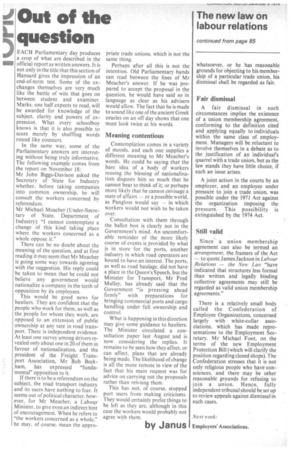Out of the question
Page 88

If you've noticed an error in this article please click here to report it so we can fix it.
EACH Parliamentary day produces a crop of what are described in the official report as written answers. It is not only in the title that this section of Hansard gives the impression of an end-of-term test. Some of the exchanges themselves are very much like the battle of wits that goes on between student and examiner. Marks, one half expects to read, will be awarded for knowledge of the subject, clarity and powers of expression. What every schoolboy knows is that it is also possible to score merely by shuffling words round like counters.
In the same way, some of the Parliamentary answers are interesting without being truly informative. The following example comes from the report on November 18: Mr John Biggs-Davison asked the Secretary of State for Industry whether, before taking companies into common ownership, he will consult the workers concerned by referendum.
Mr Michael Meacher (Under-Secretary of State. Department_ of Industry): "I cannot contemplate a change of this kind taking place where the workers concerned as a whole oppose it."
There can be no doubt about the meaning of the question, and at first reading it may seem that Mr Meacher is going some way towards agreeing with the suggestion. His reply could 'be taken to mean that he could not believe any government would nationalize a company in the teeth of opposition by its employees.
This would be good news for hauliers. They are confident that the people who work for them, as well as the people for whom they work, are opposed to an extension of public ownership at any rate in road transport. There is independent evidence. At least one survey among drivers revealed only about one in 20 of them in favour of nationalization, and the president of the Freight Transport Association, Mr Bob Beckham, has expressed "fundamental" opposition to it.
If there is to be a referendum on the subject, the road transport industry and its users have nothing to fear. It seems out of political character, however, for Mr Meacher, a Labour Minister, to give even an indirect hint of encouragement. When he refers to "the workers concerned as a whole," he may. of course. mean the appro priate trade unions. which is not the same thing.
Perhaps after all this is not the intention. Old Parliamentary hands can read between the lines of Mr Meacher's answer. If he was prepared to accept the proposal in the question. he would have said so in language as clear as his advisers would allow. The fact that he is made to sound like one of the ancient Greek oracles on an off day shows that one must look twice at his words.
Meaning contention's
Contemplation comes in a variety of moods, and each one supplies a different meaning to Mr Meacher's words. He could be saying that the bare idea of a body of workers reusing the blessing of nationalization disgusts him so much that he cannot bear to think of it; or perhaps more likely that he cannot envisage a state of affairs — or a possible world, as Pangloss would say — in which workers would not wish to be taken over.
Consultation with them through the ballot box is clearly not in the Government's mind. An uncomfortable reminder of the more likely course of events is provided by what is in store for the ports, another industry in which road operators are bound to have an interest. The ports, as well as road haulage. did not have a place in the Queen's Speech, but the Minister for Transport, Mr Fred Mulley, has already said that the Government "is pressing ahead firmly" with preparations for bringing commercial ports and cargo handling under full ownership and control.
What is happening in this direction may give some guidance to hauliers. The Minister circulated a consultation paper last August and is now considering the replies. It remains to be seen how they affect, or can affect, plans that are already being made. The likelihood of change is all the more remote in view of the fact that his main request was for advice on carrying out the proposals rather than reivisng them.
This has not, of course, stopped port users from making criticisms. They would certainly prefer things to be left as they are, although in this case the workers would probably not agree with them.
by Janus












































































































































